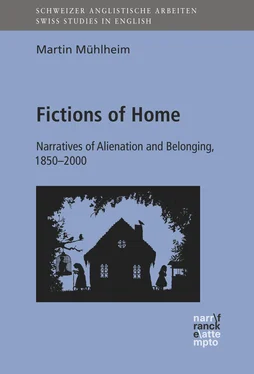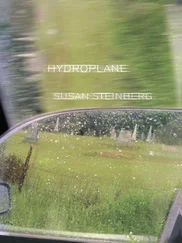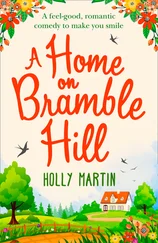In WoolfWoolf, Virginia’s novel, this sense of ambivalenceambivalence revolves, specifically, around the nature of everydayeveryday life in LondonLondon, the EmpireEmpire’s proud metropolitan center.133 However, the novel’s key question is not, as some critics suggest, whether or not it is possible to feel at home in the modern metropolis (Ellis 76; see also HawthornHawthorn, Jeremy 78; WhitworthWhitworth, Michael 153). Rather, Mrs. Dalloway explores whether, given the state of British society in the 1920s, to feel at home in the capital is morally justifiable . In the previous chapters, we mainly examined the factors that make it more difficult to feel at home for some characters than for others; accordingly, the focus was on the potential obstacles to an individual’s sense of belonging. We have thus not yet asked whether there may be circumstances under which one should not truly want to feel at home because the ethical price for belonging is simply too high. It is this question that we will address in the present chapter.
Part of the discussion will revolve around the way in which WoolfWoolf, Virginia’s novel constructs both geographical and discursive space. We will begin by examining how Mrs. Dalloway reflects and renegotiates English debates about the relative merits of the citycity and the country as sites of home . In particular, the novel dissects the familiarfamiliarity idyllidylls of the English country housecountry house, laying bare some of its ideological limitationslimitations and pitting it against the pulsating and spectacular space of the modern city. At the same time, however, the space of the city also appears as very precisely delimited in WoolfWoolf, Virginia’s novel, at least for those associated with Clarissa Dalloway and her social circle. In part, the novel uses shifting narrative perspectivesnarrative perspective to open up this delimited social space, but even the scope of these narrative shifts has very precise boundaries, depending on the characters with whom they are associated. Ultimately, Mrs. Dalloway confronts us with characters whose discursive space of belonging is every much as confined and contested as their geographical room for maneuver in the city.
In order better to understand the conflicts between these characters, we will therefore have to shift the emphasis from the spatial dimensions of home to what we might call the temporalitytemporality of belonging. In effect, the novel contrasts characters who – for various reasons – gravitate toward a timeless, mythical view of life with those who are more firmly rooted in historical time. The novel’s postwar context is vital here, as the repressionrepression of history has much to do with a desiredesire on the part of Clarissa, in particular, to evade questions of responsibilityresponsibility and social injusticeinjustice. In consequence, Clarissa and others from her circle not only misread the novel’s most tragic figures, Septimus and Lucrezia Warren Smith; they also fail to reflect on the extent to which their own sense of belonging depends on their social position within a political eliteelite that is at least partly responsible for the disasters of the Great War. Importantly, Mrs. Dalloway does not fault these characters for their desire to belong. Rather, the novel emphasizes that their sense of belonging comes at a price, and it encourages us continually to judge whether this ethical price is worth paying. In its wanderings through the imperial citycity, Mrs. Dalloway thus constitutes nothing short of a narrative quest for an ethicsethics of home.
If debates about the modern metropolis as a problematic kind of home shed light on WoolfWoolf, Virginia’s novel, then this is in part because LondonLondon has been a central reference point in such discussions since at least the period of the EnlightenmentEnlightenment. Raymond WilliamsWilliams, Raymond, for instance, points out that Enlightenment thinkers like VoltaireVoltaire and Adam SmithSmith, Adam disagreed fundamentally with regard to both the nature and the ethical value of the citycity as a site of home:
VoltaireVoltaire saw the pursuit of industry and urbane pleasurepleasure as the marks of the citycity and thence of civilisation itself. The golden age and the Garden of EdenEden, Garden of, lacking industry and pleasure, were not virtuous but ignorant; the city, and especially LondonLondon, was the symbolsymbol of progressprogress and enlightenment, its social mobilitymobility the schoolschool of civilisation and libertyliberty […]. Adam SmithSmith, Adam, rather differently, saw the city as securing the industry of the country: a centre of freedomfreedom and order but in its very dependencedependence as a market and manufacturing centre liable to breed a volatile and insecure people. (144)
At a time when the modern industrial cities were only beginning to emerge, LondonLondon was thus already envisaged as both an ideal home and a potentially dangerous space: the cradle of freedomfreedom and civilized order, but also a breeding ground for “volatile” urban masses.
In the late nineteenth century, similar arguments were waged in the field of sociology, though by now the metaphoric terms of the debate had shifted from the EnlightenmentEnlightenment contrast between unruliness and order to an opposition – better suited to industrializedindustrialization society – between organicorganicism and mechanicalmechanical and mechanization ways of life. In his Gemeinschaft and Gesellschaft ( Community and Society , 1887), Ferdinand TönniesTönnies, Ferdinand suggested that the supposedly organicorganicism ruralrural communities of the past were increasingly being replaced by a rationalized urban societyurban society dominated by merely mechanicalmechanical and mechanization relations of exchange (Delanty 32–33). Only sixteen years later, however, Émile DurkheimDurkheim, Émile provocatively reversed TönniesTönnies, Ferdinand’s thesis in De la division du travail social ( The Division of Labor in Society , 1893) – an argument that Phil Hubbard has summarized succinctly:
For DurkheimDurkheim, Émile […], traditional, ruralrural life offered a form of mechanicalmechanical and mechanization solidaritysolidarity with social bonds based on common beliefs, custom, ritualritual, routines, and symbols. Social cohesioncohesion was thus based upon the likeness and similarities among individuals in a society. DurkheimDurkheim, Émile argued that the emergence of citycity-state [sic] signalled a shift from mechanicalmechanical and mechanization to organicorganicism solidarity, with social bonds becoming based on specialisation and interdependence. […I]n contrast to feudal and rural social orders, urban societyurban society was one which allowed for the coexistence of social differences, with a complex division of labour (where many different people specialise in many different occupations) creating greater freedomfreedom and choice for individuals. (15–16; original emphasis)
Whereas in TönniesTönnies, Ferdinand’s view ruralrural society was organicorganicism because it was based on ‘natural’ kinship relations, DurkheimDurkheim, Émile, by contrast, regarded such kinship relations as automatic or ‘mechanicalmechanical and mechanization’ because they lacked any element of freedomfreedom and individual choice (Delanty 38). In short, while TönniesTönnies, Ferdinand idealizedidealization life in the country, DurkheimDurkheim, Émile – much like VoltaireVoltaire a century before him – viewed rural existence as narrow-minded and stifling when compared with the exhilarating freedom of the citycity.
Such debates over the relative value of ruralrural and urban homes arguably had a particularly strong resonance in BritainBritain due to the very common cultural association of rural life with ‘true EnglishnessEnglishness.’134 As David GervaisGervais, David has shown, it was in the course of the nineteenth century, when the new, industrial cities emerged, that writers increasingly located true Englishness in the rural existence of a rapidly disappearing yeoman classclass (4). An example for this trend is the influential Garden City movement, which attempted to reintroduce some of the supposedly redemptive qualities of rural life into the citycity (GiffordGifford, Terry 37; Hubbard 61). Even for city-dwellers, the English domestic ideal thus became associated with images of country mansionsmansions and rural cottagescottages:
Читать дальше












